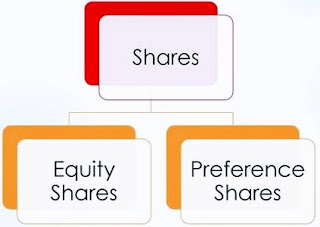Shares
Define Shares
Shares:
The share capital of a company is divided into small units called shares.
Shares are offered to the public for subscription. The person who purchases a time is called share holder. The share capital of the company's meant for long term requirements because it need not be paid during life time of the company.
Defination:
Share is defined by sec.2(46) of the companies Act as a share in the share capital of a company and includes stock except where a distinction is expressed or implied."
Share carries with it certain rights and liabilities. It secures to its owner the right to receive a proportionate part of the profits and a proportionate part of the profits and a proportionate part of the assets of and obligations.
A share is evidenced by a share certificate. Each share in a company having share capital is distinguished by its number.
Different types of shares:
Types of shares:
Companies secure most of their capital by issuing shares to the public. The shares issued by a company can be broadly divided into three classes namely
* Preference Shares
* Equity Shares
* Deferred shares
The companies Act 1956, allows a public Limited company to issue only two types of shares namely preference Shares and equity Shares.
Preference Shares:-
Preference Shares are those which carry preference over other classes of shares in the payment of dividend and repayment of capital at the time of winding up.
The rate of dividend on a preference Share is fixed. Only when the company makes a profit then shareholders are paid dividends first out of profits of the company. Similarly at the time of winding up of company preference shareholders capital must be repaid first. These shareholders have no voting rights, expect under certain special circumstances. Thus preference shareholders enjoy priority over other classes of shareholders. These shares are best suited for the people who are cautious.
Equity Shares:-
These shares are also called as ordinary shares. Equity Shares do not enjoy any special rights. The equity shareholders. Similarly in the event of winding up of company, equity shareholders are paid back their capital.
Equity shareholders possess voting rights and hold control over the affairs of the company. If the business is successful they get divided. The rate of dividend on these shares is not fixed. Hence the dividend on these shares changes with the fortunes of the company. The rights and privileges of equity Shares are laid down in the articles.
Deferred shares:-
These shares are also known as founder's shares or management shares.
These shares are usually issued to promoters or founder's of the company in consideration of their valuable services towards the formation of the company. Shareholders of deferred shares will receive dividend only after preference and equity shareholders. Similarly at the time of winding up, they receive their capital in the last. The companies Act 1956, prohibited the issue of deferred shares by a public limited company from 1st April 1956. Shares issued prior to this date remain valid.





Comments
Post a Comment